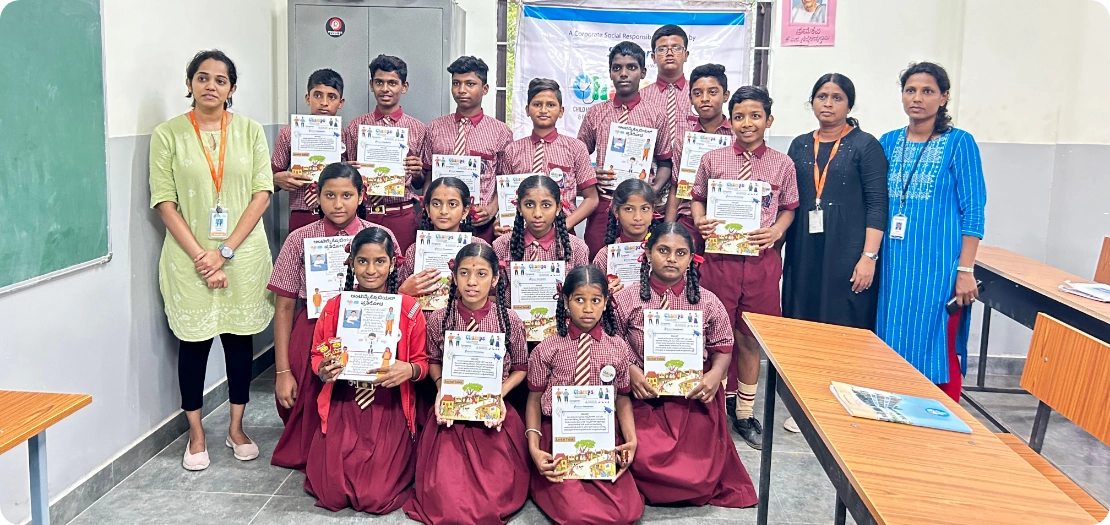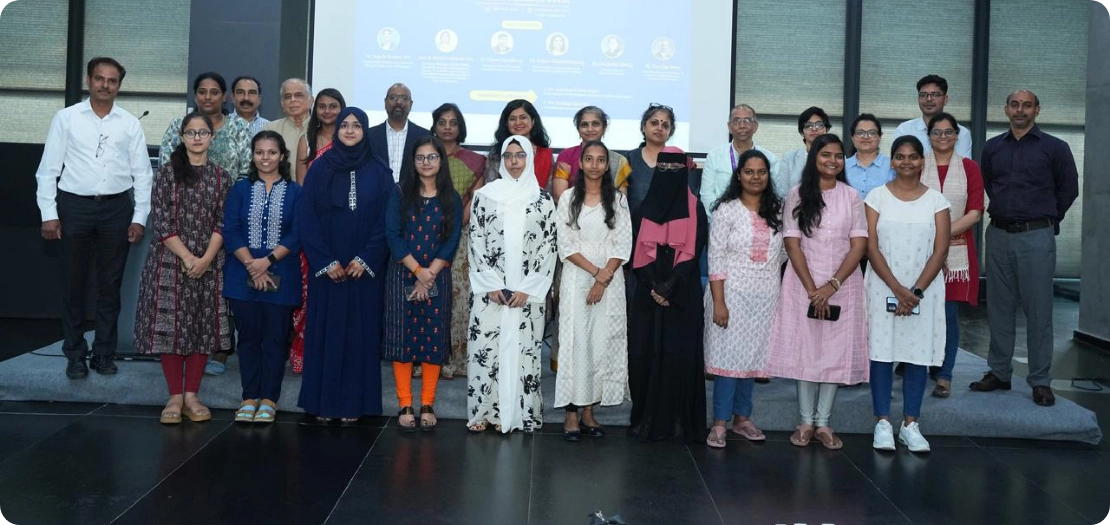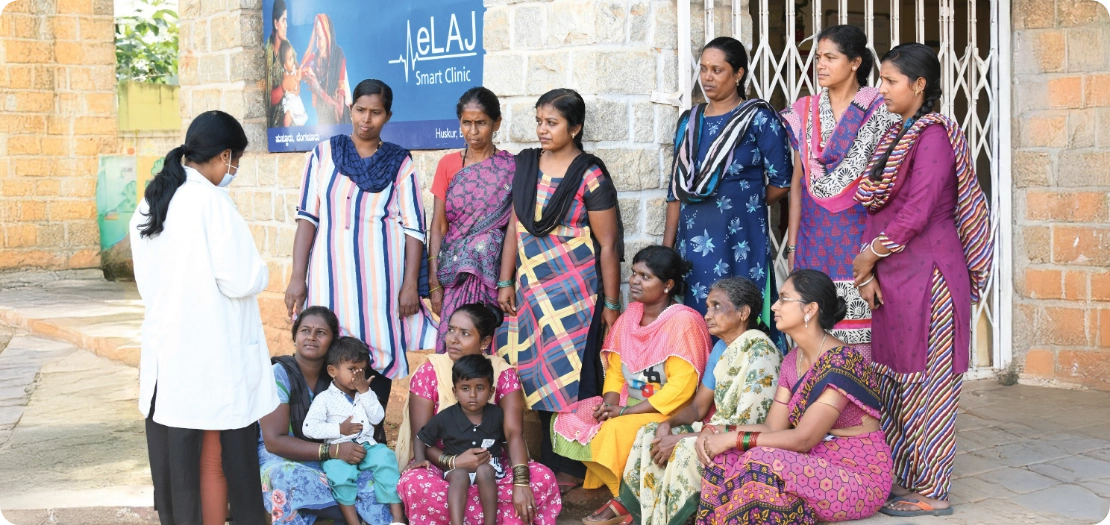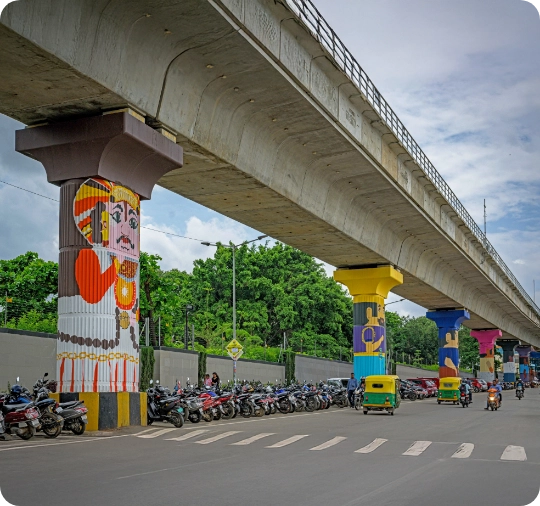CHAMPS empowers government school students (grades 8–9) to screen adults in their communities for hypertension and promote healthy habits. 100 students screened over 1,000 individuals across 17 villages, supporting early detection of non communicable diseases (NCD) and creating awareness.
With 11 clinics in operation, eLAJ improves access to preventive and primary care. The clinics recorded 20,000 new registrations, 43,000 patient visits, 42,000 lab tests, and screened 6,100+ individuals.
In partnership with Sahyadri Community Development & Women Empowerment Society (SCODWES), we established an NCD surveillance and outpatient center in Devanalli, serving over 10,000 people across six tribal villages.
Over 2,900 higher primary and high school students across 27 schools underwent health screening and received health cards. Screenings found 36% anemic, 34% needing dental care, and 64% underweight. Awareness sessions covered nutrition, menstrual health, and hygiene.
Approximately 3,000 individuals were screened for diabetes, hypertension, and anemia through 58 screening camps conducted across various settings (14 at workplaces, 12 at Primary Healthcare Centers and 32 within communities), including pourakarmikas* and small factories. These camps were organized with support from NGOs and civil society organizations. The screenings identified 4.3% with diabetes, 10.2% with hypertension, and 35.3% with abnormal anemia levels.
Additional screenings included 3,300 ECGs, 2,500 breast exams (4.8% referred), and 5,200 oral cancer checks (26.2% had risk habits).

Child Health Activists Mentoring and Promoting health in Society (CHAMPS)
Over 4,000 consultations were delivered across NCDs, geriatrics, maternal and child care, ophthalmology, and mental health.
A third-party impact assessment for eLAJ Smart Clinics has been undertaken by the Indian Institute of Management Bangalore (IIMB).
Management for Holistic Engagement and Action for Long-Term Health (M-HEALTH) Framework for eLaj Smart Clinics:
The eLAJ Smart Clinics, an initiative of Syngene in partnership with the Biocon Foundation, clearly align with their mission to deliver affordable and accessible healthcare to underserved communities. Over 65% of patients are below the poverty line or possess Antyodaya cards, reflecting significant economic need. Educational attainment is limited, with around 44% having studied only up to Class VII–X and 23% lacking formal education. Nearly half of the patients are unemployed. These indicators underscore eLAJ’s commitment to reaching populations that face substantial socioeconomic barriers to healthcare access.
eLAJ Smart Clinics ensure high-quality care through standardized SOPs, and annually assessed Quality Policy. Continuity of care is maintained with detailed patient histories and regular follow-ups – 93.1% of patients with hypertension and/or diabetes visit monthly. Medication adherence is high: 87.1% for hypertension, 93.1% for diabetes, and 97.1% for patients with both conditions.
Complication screenings are done biannually through the NCD package, which includes kidney function tests, liver function tests, HbA1c and regular Cardiovascular disease (CVD) risk scoring. The clinics also offer multiple specialist consultations via partnerships with Oxford Medical College and St. Johns Medical college. Notably, 91.2% of patients reported that all the diagnostic tests were conducted at the clinics, free of cost.
The eLAJ initiative capitalizes on strong partnerships with NGOs, medical colleges, and the Government of Karnataka to reach diverse populations, including school children, factory workers, and migrants. The Biocon Foundation collaborates closely with the village panchayats in Hennagara and Huskur, where the panchayats provide land and buildings for the clinics, fostering local ownership.
Additionally, the Foundation partners with two medical colleges: St. John’s Medical College supports the Austintown clinic with medical officers, specialists, and capacity building for eLAJ staff, while Oxford Medical College provides a medical officer for the Huskur clinic and specialists for both Huskur and Hennagara clinics, enhancing clinical quality and services.
The eLAJ healthcare workers conduct extensive house-to-house Community-Based Assessment Checklist (CBAC) surveys and NCD screenings using the Epicollect app. In addition, the community outreach team carries out NCD and common cancer screenings at various locations, reaching diverse populations across communities, factories, schools, and even national parks. Between November 2023 and April 2025, 3,227 individuals were screened through household visits.
In the financial year FY25, 58 community outreach camps screened a total of 5,157 people (2,011 males and 3,146 females). Key findings from these screenings include a 26% enrollment in the mHealth app due to widespread tobacco use, 4.8% of women suspected of breast cancer, 10.19% suspected hypertension, 4.34% suspected diabetes, 29.22% overweight, 12.27% obese, and 35.33% suspected anemia. Additionally, ECGs were performed on 1,612 individuals as part of the comprehensive screening process.
eLAJ’s NCD care model demonstrates strong clinical performance, with a majority of patients achieving controlled blood pressure and blood glucose levels. Regular screening for complications likely contributes to early detection and prevention. Among all the NCD patients surveyed, only 5% reported hospitalizations between April 2024 and April 2025, with just 2.6% cases linked to NCD-related complications such as hypertension, diabetes, or cardiovascular conditions – underscoring the effectiveness of eLAJ’s proactive and preventive approach to NCD management.
Many patients, particularly men, may find it difficult to visit clinics during standard hours due to work or caregiving responsibilities. Exploring early morning or late evening clinic hours could improve access.
Consistent availability of medications remains a challenge. Strengthening the supply chain is necessary to ensure uninterrupted treatment.
The Electronic Medical Record (EMR) system is not integrated with other data platforms (e.g., Epicollect), and NCD data is only partially digitized. A unified Health Management Information System (HMIS) aligned with Ayushman Bharat Digital Mission (ABDM) standards, including unique patient identifiers, would enhance tracking, continuity of care, and epidemiological research.
Biocon Foundation is already addressing this need by developing a new, comprehensive EMR version that is fully compliant with ABDM guidelines.
The Indian Institute of Science (IISc) is making a significant leap in its journey by expanding into the field of medicine with the establishment of a postgraduate medical school and an 800-bed, not-for-profit hospital. This landmark initiative aims to integrate clinical and basic sciences with engineering. The upcoming hospital will host comprehensive clinical and surgical departments across multiple super specialties, while leveraging cutting-edge digital technologies and solutions to enhance both healthcare delivery and operational efficiency. As part of this visionary expansion, the Biocon-Syngene General Medicine Wing is slated to open in late 2025, contributing to IISc’s mission of fostering excellence in interdisciplinary medical research, education, and service.
In partnership with Agastya International, Mobile Science Labs bring hands-on science learning to remote schools. The initiative has reached 5,200 students in 47 schools across Anekal and Chikkaballapura, delivering over 112,000 learning hours through 1,700+ sessions.
This initiative delivers mobile science education to remote areas, sparking curiosity through 670 sessions and 47,600 learning hours for 2,400 students across 23 schools in Medchal-Malkajgiri and Dakshina Kannada.
The third edition of Synquizitive engaged students from 200 government schools across three regions. Supported by 350+ Syngene volunteers, the quiz encouraged application-based learning. Winning schools received smart classrooms, with dignitaries present for the felicitation.
The program run in Hyderabad provides scholarships, mentorship, and industry exposure to women. The second cohort supported 30 women; the third will include 40.

STEM scholarships and mentorship for women
Syngene Research in Science Excellence (SynRISE) offers PhD assistantships to women in STEM fields. In its first year, Syngene supported three women PhD students from underprivileged backgrounds at the Institute of Bioinformatics and Applied Biotechnology (IBAB).
During FY25, Biocon Academy, in collaboration with Syngene, achieved significant milestones in biotechnology education and industry engagement.
These initiatives reflect the strong collaboration between Biocon Academy and Syngene in driving industry-ready talent through comprehensive training programs, hands-on experiences and active industry engagement.

eLAJ Smart Clinics – Community health outreach
To ease Bengaluru’s traffic and promote green transit, Syngene invested Rs 98 Mn over five years in the Biocon-Hebbagodi Metro Station, part of BMRCL’s Yellow Line, opening in 2025.
Additional enhancements include painting 53 pier walls, creating 38, and installing murals inspired by Channapatna art, celebrating everyday heroes – garnering public and media attention.
A new bus stop beneath the station will further strengthen road-rail connectivity.
Syngene’s third Miyawaki forest in Pachanady, Mangaluru, covers 21,780 sq. ft. with 1,000 native saplings – reducing pollution, odor, and landslide risks.
In partnership with Biocon Foundation, Syngene supported the restoration of Hebbagodi Lake through desilting, sludge removal, and sewage diversion, creating a thriving, sustainable wetland.

eLAJ Smart Clinics – Community health outreach
A new Children’s Park was inaugurated at Bajpe, Dakshina Kannada by MLA Umanath Kotian, benefiting 300+ families displaced by Mangaluru development.
Around 500 Syngene employees contributed to various social and environmental initiatives.
| Initiative | Impact |
|---|---|
| Eco‑Clubs in Schools | Volunteers conducted environmental awareness sessions, quizzes, and donated color‑coded bins to five government schools |
| Urban Afforestation Drive | Employees and students planted saplings at Chikkanagamangala Lake on World Environment Day |
| World No Tobacco Day Awareness | Sessions held in 14 government schools, educating 700+ students through interactive activities |
| STEM Mentorship Program | 21 Syngene scientists mentored 30 women from the 2nd cohort of the scholarships and industry internships program |
| Education Support | 350+ employees facilitated written qualifier tests in government schools across Bengaluru, Mangaluru, and Hyderabad |